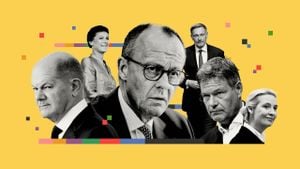The German Federal Elections of 2025 have shifted the political dynamics significantly as the conservative party CDU/CSU, led by Friedrich Merz, has claimed victory. Initial reports estimate the CDU/CSU garnered between 28.5% and 29% of the votes, marking their return to power after three years of opposition. This election was characterized by high voter turnout, reaching around 83%, the highest since the reunification of Germany.
Merz, who is poised to become Germany’s next Chancellor, proclaimed the CDU’s victory as decisive, stating, "We have won these federal elections. [...] We must quickly create a stable government with a strong parliamentary majority." His desire for swift coalition formation highlights the urgency felt by many to stabilize the government amid pressing challenges.
Meanwhile, the far-right Alternative for Germany (AfD) achieved its best results ever, securing approximately 20% of the votes, effectively doubling its support since the last election. The co-leader of the AfD, Alice Weidel, expressed confidence, noting, "Our hand will always be extended to participate in government and fulfill the will of the people." This statement underlines the AfD’s ambitions of gaining significant influence within the new government structure.
The Social Democratic Party (SPD), currently led by Olaf Scholz, faced significant setbacks, receiving between 16% and 16.5% of the vote, marking its worst electoral performance since the formation of the Federal Republic of Germany. Scholz acknowledged this defeat, stating simply, "The election result is bad, and I take responsibility for it." His concession reflects the mounting pressures and criticisms faced by the SPD, especially concerning its handling of economic issues and immigration policies.
With the CDU/CSU's clear lead and the AfD's rise, the prospects for coalition-building present both opportunities and challenges. Coalition possibilities could include traditional alliances, but the entrance of the AfD complicates potential partnerships. Merz has publicly excluded any coalition with AfD, yet Weidel has expressed the necessity of engaging for any meaningful policy changes moving forward.
A look at the electoral map indicated regional voting patterns, showing variations across federal states, which will complicate coalition negotiations. Various scenarios were proposed for possible government formations, ranging from traditional alliances excluding the AfD to more fragmented coalitions involving multiple parties.
The backdrop of this electoral outcome involved increasing dissatisfaction among voters, driven by economic anxiety and security concerns. Recent incidents of violence have placed immigration and public safety at the forefront of voter priorities, shifting focus away from traditional economic narratives.
Olaf Scholz’s government, which has been criticized for its handling of the economic fallout and internal security, faced intense scrutiny from the electorate, evidenced by the dramatic drop in support. The outcomes of the election may prompt significant realignments within the SPD as it grapples with its future direction and strategy.
The left-wing parties, including Die Linke and the Greens, also suffered setbacks, though they maintain significant representation. Their responses will be pivotal to shaping legislative dynamics moving forward as Merz navigates potential coalitions.
The high turnout reflects citizen engagement and concern over the direction of Germany, signaling possible volatility as Merz’s government takes shape. The results indicate not only the clear victory for CDU/CSU but also the emergence of the AfD as a central player, pushing the limits of traditional discourse.
Moving forward, Friedrich Merz’s administration will face increased pressure to deliver on campaign promises and address the electorate's heightened concerns, especially around security and economic stability. The political climate is charged, and the need for effective governance has never been more pronounced.
This election could signal historical changes within Germany’s political system, as the ramifications of the far-right’s rise are still uncertain. Observers are closely watching potential coalition dynamics, the economic recovery efforts, and how effectively the new leadership can address core issues facing the nation.



